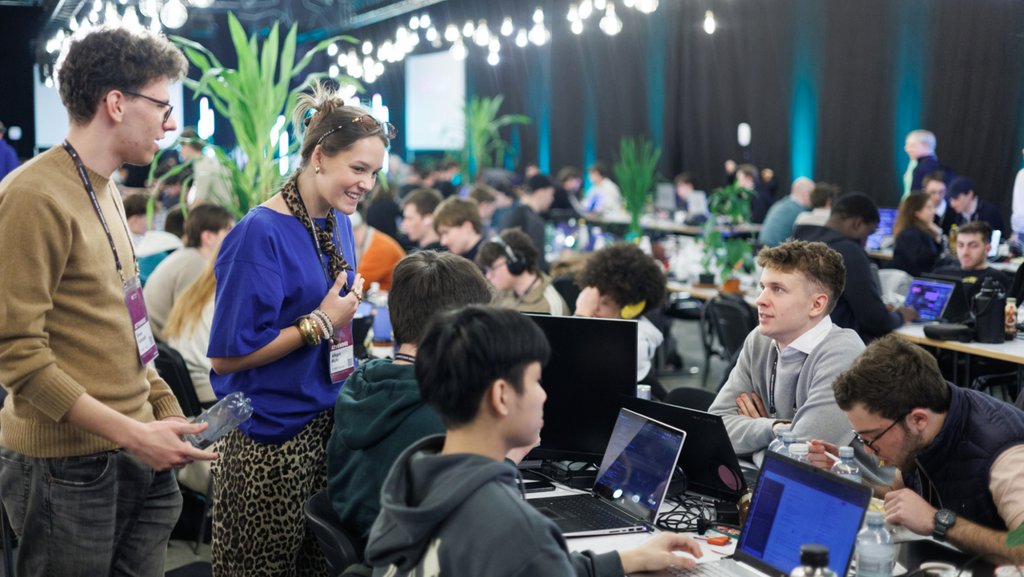Campus - 10.11.2025 - 09:00
As documented in the new "HSG Entrepreneurship Monitor 2025", a total of 845 start-ups were created in the HSG environment between 2014 and 2024. As of 31 August 2025, 118 carry the official HSG spin-off label and 64 the HSG start-up label. According to a comparative study by the Technical University of Munich, this makes HSG one of the three most entrepreneurial universities in the German-speaking world – behind the TUM and ETH Zurich.
The monitor systematically records the HSG entrepreneurship ecosystem and provides an overview of start-ups, spin-offs, support programmes, new entrepreneurial initiatives and talent. The most important points of the new overview in brief:
"For us, entrepreneurship is not just an academic subject, but a central pillar of our innovation culture and an indispensable resource for sustainable growth and social progress," says Dietmar Grichnik, professor of Entrepreneurship and HSG vice-president. The aim is to link research, teaching and practice in such a way that students, "recognise entrepreneurial opportunities and develop sustainable business models."
Grichnik describes the monitor as "an important part of our efforts to continuously record, understand and specifically develop the entrepreneurial ecosystem". Based on this data, the university wants to systematically learn which conditions promote innovation – and how knowledge can be transferred even more efficiently to business and society. In a world characterised by technological upheaval, globalisation and climate change, HSG sees entrepreneurship as a decisive lever for, "developing solutions and breaking new ground.” According to Grichnik, it therefore wants to strengthen an innovative, responsible and courageous start-up culture and cooperation with technical universities such as ETH along the “Alpine innovation axis“ Munich-St.Gallen-Zurich.
With the Best Founders Programme and the HSG START Accelerator, the university is specifically expanding its support network for founders. Two funding lines – Entrepreneurial Talents and Entrepreneurial Champions – accompany start-up talents from the initial idea to sustainable market entry. "Our goal is to empower students, researchers and alumni alike to manage risks and act entrepreneurially,” emphasises Grichnik. To this end, HSG combines practical programmes with research-based knowledge – for example, at the Global Centre for Entrepreneurship and Innovation (GCEI-HSG), which conducts studies on sustainable innovation and responsible growth.
Two entrepreneurial champions got started in autumn 2025: Carmel Imhof and Henry Müller each received a grant of CHF 100,000 to adapt their business model to market needs, win their first customers and prepare to launch their spin-offs. Carmel Imhof, founder of the digital health platform ZoneIn, describes the impact of this support this way: "HSG gave me the network and the confidence to turn an idea into a scalable product.” Her platform connects ADHD patients with certified experts – and is set to expand throughout the German-speaking region soon. Henry Müller, co-founder and CEO of fortyfour, is working on a technology for direct CO2 removal from the atmosphere (Direct Air Capture, DAC). The PhD candidate from the University of St.Gallen combines sustainable entrepreneurship with cutting-edge research. His company develops specialised, fully electric DAC systems that convert CO2 directly on site for agricultural and industrial applications – as a clean and cost-effective alternative to fossil sources.
Social and environmental impact also plays an important role in the University of St.Gallen's start-up ecosystem. This is demonstrated, for example, by UpGrain from Appenzell, a spin-off that extracts nutrient-rich proteins from brewery waste. Co-founder Vincent Vida explains: "We don't see waste as a problem, but as a resource." UpGrain won the Swiss Sustainability Impact Award in 2025 and now supplies the Swiss Army with sustainable products. Grichnik points out that HSG understands, "sustainable business models as an integral part of innovation." Entrepreneurship should not only be economically successful, but also socially relevant – an idea that is also anchored in the university's Strategic Plan 2030.
In addition to technology, diversity also plays a central role in development. With its Female Mentoring Programme, HSG aims to specifically promote new female founders. As the monitor shows, 11% of HSG start-ups have been founded by women to date, and the trend is rising. "Our goal is an inclusive, diverse ecosystem that enables innovation from all sides,” says Grichnik. HSG's understanding of entrepreneurship encompasses the entire community – students, researchers, alumni and partners. "We want to create an environment that encourages people to try new things and take responsibility." HSG thus sees itself not only as an educational institution, but also as a catalyst for social change.
As the HSG Entrepreneurship Monitor shows, numerous former HSG students have founded start-ups that are shaping today's markets. One example is Planted Foods, co-founded by HSG alumnus Pascal Bieri. Together with his team, he wants to fundamentally change the way meat is produced and consumed. Thanks to Planted products, more plant-based proteins are to end up on our plates instead of animal proteins. "In St.Gallen, I met so many people who encouraged me to just try things out. I was also inspired by the entrepreneurial spirit and the students' desire to make a difference," recalls Pascal Bieri. Another example of student entrepreneurial spirit is the newly founded company LexTec, founded by HSG law student Joy Rauchenstein. She describes her invention as a kind of ChatGPT for the legal sector. Her company is launching a new legal tech tool that is designed to make legal research much more efficient.
For the future, the University of St.Gallen plans to update the HSG Entrepreneurship Monitor annually and further expand St.Gallen as a starting point for start-up journeys. Dietmar Grichnik clearly articulates the goal. "We want to become the leading European hub for entrepreneurship – with global impact and regional responsibility."
More articles from the same category
This could also be of interest to you
Discover our special topics
